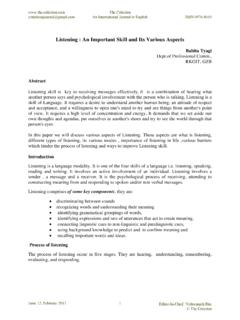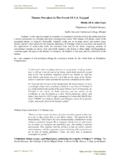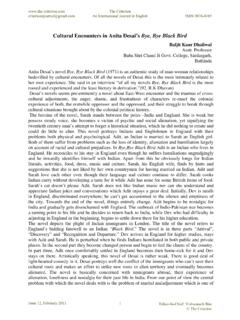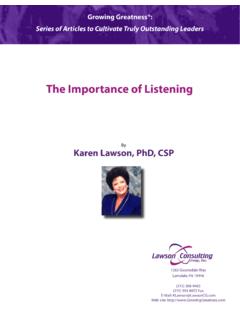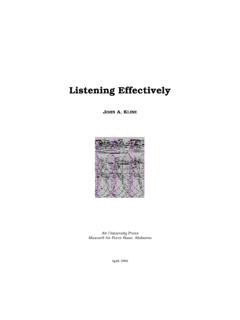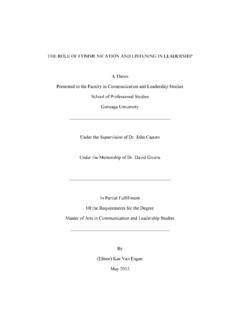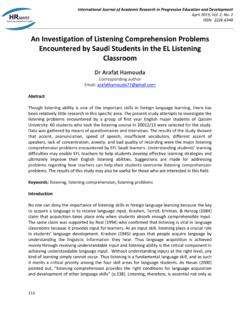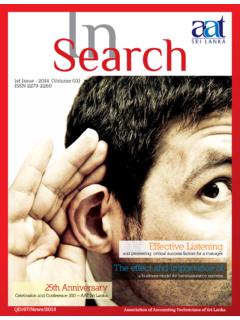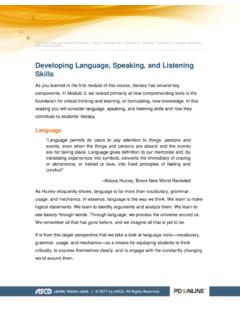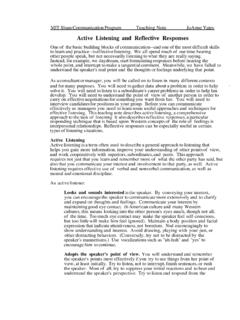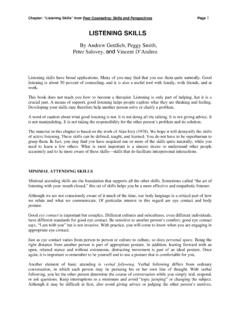Transcription of Listening : An Important Skill and Its Various Aspects
1 Listening : An Important Skill and Its Various Aspects Babita Tyagi Professional Comm., RKGIT, GZB Abstract Listening Skill is key to receiving messages effectively. It is a combination of hearing what another person says and psychological involvement with the person who is talking. Listening is a Skill of Language. It requires a desire to understand another human being, an attitude of respect and acceptance, and a willingness to open one's mind to try and see things from another's point of view. It requires a high level of concentration and energy.
2 It demands that we set aside our own thoughts and agendas, put ourselves in another's shoes and try to see the world through that person's eyes In this paper we will discuss Various Aspects of Listening . These Aspects are what is Listening , different types of Listening , its Various modes , importance of Listening in life , Various barriers which hinder the process of Listening and ways to improve Listening Skill . Introduction Listening is a language modality. It is one of the four skills of a language Listening , speaking, reading and writing.
3 It involves an active involvement of an individual. Listening involves a sender , a message and a receiver. It is the psychological process of receiving, attending to constructing meaning from and responding to spoken and/or non verbal messages. Listening comprises of some key components, they are: discriminating between sounds recognizing words and understanding their meaning identifying grammatical groupings of words, identifying expressions and sets of utterances that act to create meaning, connecting linguistic cues to non-linguistic and paralinguistic cues, using background knowledge to predict and to confirm meaning and recalling Important words and ideas.
4 Process of Listening The process of Listening occur in five stages. They are hearing, understanding, remembering, evaluating, and responding. Criterion An International Journal in EnglishISSN 0976-8165 Issue 12, February : Vishwanath Bite The Criterion HEARING It is refered to the response caused by sound waves stimulating the sensory receptors of the ear; it is physical response; hearing is perception of sound waves; you must hear to listen, but you need not listen to hear (perception necessary for Listening depends on attention).
5 Brain screens stimuli and permits only a select few to come into focus- these selective perception is known as attention, an Important requirement for effective Listening . UNDERSTANDING- This step helps to understand symbols we have seen and heard, we must analyze the meaning of the stimuli we have perceived; symbolic stimuli are not only words but also sounds like and sights like blue have symbolic meanings as well; the meanings attached to these symbols are a function of our past associations and of the context in which the symbols occur.
6 For successful interpersonal communication, the listener must understand the intended meaning and the context assumed by the sender. REMEMBERING- Remembering is Important Listening process because it means that an individual has not only received and interpreted a message but has also added it to the mind s storage bank. In Listening our attention is selective, so too is our memory- what is remembered may be quite different from what was originally seen or heard. EVALUATING- Only active listeners participate at this stage in this point the active listener weighs evidence, sorts fact from opinion, and determines the presence or absence of bias or prejudice in a message; the effective listener makes sure that he or she doesn t begin this activity too soon.
7 Beginning this stage of the process before a message is completed requires that we no longer hear and attend to the incoming message-as a result, the Listening process ceases RESPONDING- This stage requires that the receiver complete the process through verbal and/or nonverbal feedback; because the speaker has no other way to determine if a message has Step-1 Receiving (Hearing) Step-2 Understanding (Learning) Step-3 Remembering (Recalling) Step-4 Evaluating (Judguing) Step-5 Responding (Answering) Criterion An International Journal in EnglishISSN 0976-8165 Issue 12, February : Vishwanath Bite The Criterion been received, this stage becomes the only overt means by which the sender may determine the degree of success in transmitting the message.
8 Strategies of Listening Listening strategies are techniques or activities that contribute directly to the comprehension and recall of Listening input. Listening strategies can be classified by how the listener processes the input. Top-down strategies are listener based. The listener taps into background knowledge of the topic, the situation or context, the type of text, and the language. This background knowledge activates a set of expectations that help the listener to interpret what is heard and anticipate what will come next.
9 Top-down strategies include Listening for the main idea predicting drawing inferences summarizing Bottom-up strategies are text based; the listener relies on the language in the message, that is, the combination of sounds, words, and grammar that creates meaning. Bottom-up strategies include Listening for specific details recognizing cognates recognizing word-order patterns Three Basic modes of Listening Active or Reflective Listening It is the single most useful and Important Listening Skill . In active Listening , the listener is genuinely interested in understanding what the other person is thinking, feeling, wanting or what the message person is active in checking his understanding before he respond with his new message.
10 The listener restate or paraphrase our understanding of the message and reflect it back to the sender for verification. This verification or feedback process is what distinguishes active Listening and makes it effective. Essentials of Active Listening 1. Intensity 2. Empathy 3. Acceptance 4. Recognizing responsibility for completeness Passive or Attentive Listening The listener is genuinely interested in hearing and understanding the other person s point of view. He will be attentive and will passively listen. The Listener assume that what he heard and understand is correct but stay passive and do not verify it.
